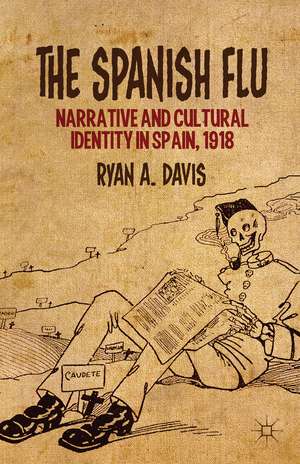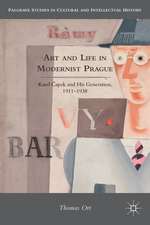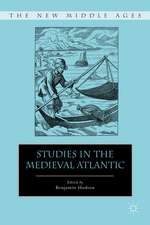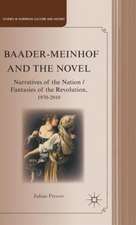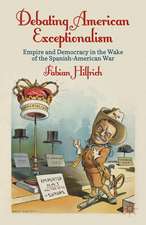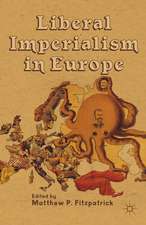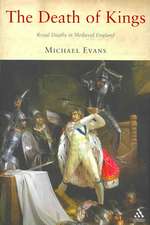The Spanish Flu: Narrative and Cultural Identity in Spain, 1918
Autor R. Davisen Limba Engleză Hardback – 23 aug 2013
| Toate formatele și edițiile | Preț | Express |
|---|---|---|
| Paperback (1) | 636.80 lei 6-8 săpt. | |
| Palgrave Macmillan US – 23 aug 2013 | 636.80 lei 6-8 săpt. | |
| Hardback (1) | 640.88 lei 6-8 săpt. | |
| Palgrave Macmillan US – 23 aug 2013 | 640.88 lei 6-8 săpt. |
Preț: 640.88 lei
Preț vechi: 753.97 lei
-15% Nou
Puncte Express: 961
Preț estimativ în valută:
122.63€ • 133.63$ • 103.34£
122.63€ • 133.63$ • 103.34£
Carte tipărită la comandă
Livrare economică 23 aprilie-07 mai
Preluare comenzi: 021 569.72.76
Specificații
ISBN-13: 9781137339201
ISBN-10: 1137339209
Pagini: 255
Ilustrații: XIII, 255 p.
Dimensiuni: 140 x 216 x 20 mm
Greutate: 0.43 kg
Ediția:2013
Editura: Palgrave Macmillan US
Colecția Palgrave Macmillan
Locul publicării:New York, United States
ISBN-10: 1137339209
Pagini: 255
Ilustrații: XIII, 255 p.
Dimensiuni: 140 x 216 x 20 mm
Greutate: 0.43 kg
Ediția:2013
Editura: Palgrave Macmillan US
Colecția Palgrave Macmillan
Locul publicării:New York, United States
Cuprins
Introduction: Epidemic Genre and Spanish Flu Narratives 1. Mundane Mystery: Framing the Flu in the First Epidemic Wave 2. Borders and Bodies: The Second Wave Begins 3. A Tale of Two States: Between an Epidemic and a Sanitary Spain 4. Figuring (Out) the Epidemic: Don Juan and the Spanish Flu 5. Imagining the Epidemic Nation: Citizens, Characters, and Cartoons Conclusion: A Telling Epidemic, a Storied Nation
Recenzii
“The Spanish Flu … make a significant contributionto our understanding of how civilians living within specific national culturesexperienced the epidemic … . this book richly suggests new paths for other scholarsof the 1918 flu and for the study of national cultures. … make a compellingcase for understanding epidemics within the frameworks of cultural narrativesand national agendas.” (Elinor Accampo, The Journal of Modern History, Vol. 87(4), December, 2015)
' in idea and in execution this is one of the most original studies I have ever read. In his singular passion for researching one event so extensively and completely, Ryan Davis has written a most unique, compelling, and thorough contribution to the discipline.' - Ometeca
'Davis's is a nuanced study that goes well beyond conventional social history approaches, making it a model for how histories of epidemics might be written in future.' - Social History of Medicine
"Based on the author's exhaustive research, this book offers a new analysis in English of this tremendous event in Spain, complementary to others that already exist. It centers on cultural narratives, showing how they were structured in response to this great socio-medical crisis, and perfectly links two concepts of epidemic and national identity." - María-Isabel Porras-Gallo, Professor of History of Science, University of Castile-La Mancha, Spain
"This original work takes up a series of long-running questions about modern Spanish national identity as they intersect with the highly mobile, transnational phenomenon of epidemic. While historians of medicine have produced some studies of the relationship between disease and national identity, none until now has dealt with Spain, nor have Hispanists taken note of the role of epidemic as a defining collective national event." - Sasha David Pack, Associate Professor, Department of History, University at Buffalo-SUNY, USA
' in idea and in execution this is one of the most original studies I have ever read. In his singular passion for researching one event so extensively and completely, Ryan Davis has written a most unique, compelling, and thorough contribution to the discipline.' - Ometeca
'Davis's is a nuanced study that goes well beyond conventional social history approaches, making it a model for how histories of epidemics might be written in future.' - Social History of Medicine
"Based on the author's exhaustive research, this book offers a new analysis in English of this tremendous event in Spain, complementary to others that already exist. It centers on cultural narratives, showing how they were structured in response to this great socio-medical crisis, and perfectly links two concepts of epidemic and national identity." - María-Isabel Porras-Gallo, Professor of History of Science, University of Castile-La Mancha, Spain
"This original work takes up a series of long-running questions about modern Spanish national identity as they intersect with the highly mobile, transnational phenomenon of epidemic. While historians of medicine have produced some studies of the relationship between disease and national identity, none until now has dealt with Spain, nor have Hispanists taken note of the role of epidemic as a defining collective national event." - Sasha David Pack, Associate Professor, Department of History, University at Buffalo-SUNY, USA
Notă biografică
Ryan A. Davis is Assistant Professor of Spanish in the Department of Languages, Literatures, and Cultures at Illinois State University, USA. His research on nineteenth- and twentieth-century Spain focuses on the intersection between literary and medical discourses, articulations of national and individual subjectivity, and, more recently, 'fringe' discourses like hypnotism. His published work has appeared in the Journal of Spanish Cultural Studies, Revista de Estudios Hispánicos, Decimonónica, and Ometeca. He is the co-editor of The Spanish Influenza Pandemic of 1918–1919: Emerging Perspectives from the Iberian Peninsula and the Americas (forthcoming).
